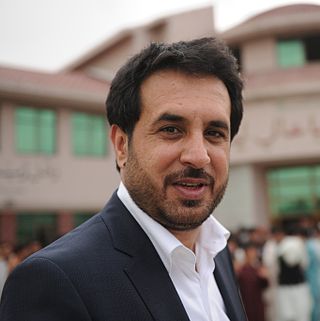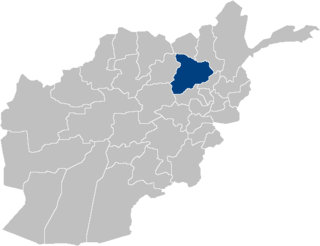Related Research Articles

Kandahār is one of the thirty-four provinces of Afghanistan, located in the southern part of the country, sharing a border with Pakistan, to the south. It is surrounded by Helmand in the west, Uruzgan in the north and Zabul Province in the east. Its capital is the city of Kandahar, Afghanistan's second largest city, which is located on the Arghandab River. The greater region surrounding the province is called Loy Kandahar. The Emir of Afghanistan sends orders to Kabul from Kandahar making it the de facto capital of Afghanistan, although the main government body operates in Kabul. All meetings with the Emir take place in Kandahar, meetings excluding the Emir are in Kabul.

Spin Boldak is a border town and the headquarters of Spin Boldak District in the southern Kandahar province of Afghanistan, next to the border with Pakistan. It is linked by a highway with the city of Kandahar to the north, and with Chaman and Quetta in Pakistan to the south. Spin Boldak has the second major port of entry between Afghanistan and Pakistan, the Wesh-Chaman border crossing. It is also a major transporting, shipping and receiving site between the two neighboring countries.
Spin Boldak is a district in the eastern part of Kandahar Province, Afghanistan. It borders Daman District to the west, Arghistan District to the north, Qila Abdullah District of Pakistan to the east and Shorabak District to the south. The population was estimated at 100,400 in 2006. The district center is the town of Spin Boldak, located in the western part of the district on the road to Pakistan.

The Taliban insurgency began after the group's fall from power during the 2001 War in Afghanistan. The Taliban forces fought against the Afghan government, led by President Hamid Karzai, and later by President Ashraf Ghani, and against a US-led coalition of forces that has included all members of NATO; the 2021 Taliban offensive resulted in the collapse of the government of Ashraf Ghani. The private sector in Pakistan extends financial aid to the Taliban, contributing to their financial sustenance.

Asadullah Khalid is a politician in Afghanistan. He served as head of the National Directorate of Security (NDS), which is the domestic intelligence agency of Afghanistan. Before his appointment as the head of the NDS in September 2012, Khalid served as the Minister of Tribal and Border Affairs. Between 2005 and 2008, he was the Governor of Kandahar Province and prior to that as Governor of Ghazni Province (2002-2005). From 2018 until 2021 he was the Minister of Defense. Khalid is said to be affiliated with the Islamic Dawah Organisation of Afghanistan and has been noted as one of many loyalists of Afghan President Hamid Karzai.

A series of occasional armed skirmishes and firefights have occurred along the Afghanistan–Pakistan border between the Afghan Armed Forces and the Pakistan Armed Forces since 1949. The latest round of hostilities between the two countries began in April 2007. Militants belonging to Tehrik-i-Taliban Pakistan and Jamaat-ul-Ahrar also use Afghanistan's territory to target Pakistani security personnel deployed along the border. The Diplomat says that the presence of terrorists belonging to Tehrik-i-Taliban Pakistan on Afghan soil is the reason for sporadic shelling of Afghanistan's territory by Pakistani security forces.
The following lists events that happened during 2004 in Afghanistan.

The 2007 Baghlan sugar factory bombing occurred on November 6, 2007, when a bomb exploded in the centre of Baghlan, Afghanistan, while a delegation of parliamentarians was visiting, killing at least 72 people including several lawmakers.
The 2008 Kandahar bombing of February 17, 2008 in Kandahar, Afghanistan, was an attack targeting a crowd of people watching a dog-fighting competition. With more than 100 killed, it was the deadliest attack on Afghan soil since 2001.

Mullah Naqib Alikozai, sometimes called Naqibullah, was an Afghan mujahideen commander and politician from the Kandahar area of southern Afghanistan. He was the leader of the Alikozai Pashtun tribe.
Operation Kamin was an offensive launched by Taliban insurgents in May 2007 which aimed to kill American-backed government forces and foreign troops in Kandahar.
2003 in Afghanistan. A list of notable incidents in Afghanistan during 2003
The following lists events that happened in 2013 in Afghanistan.

Abdul Raziq Achakzai, also known as General Raziq, was the chief of police for Kandahar Province. Many Afghans regarded him as a national hero while others viewed him simply as a warlord. In late 2001, Achakzai became a member of Gul Agha Sherzai's forces whom the Taliban had surrendered to after the U.S. invasion of Afghanistan. Achakzai was considered to be one of the most powerful security officials in Afghanistan for the last few years of his life.
On 10 January 2017, multiple bombings in Afghanistan occurred at government and tribal establishments during the renewed War in Afghanistan. The Taliban claimed responsibility for all but one of the attacks, which targeted a United Arab Emirates diplomatic mission. In total, at least 64 to at least 88 people were killed and at least 94 were wounded, with at least three attackers also being killed. Other attacks may have taken place.
Events in the year 2017 in Afghanistan.
The 2006 Taliban offensive was a major military offensive launched by the Taliban in southern Afghanistan in the spring of 2006. The offensive was planned to unfold on three main fronts concentrated in the provinces of Helmand and Kandahar: the first front was to target northern Helmand, focusing on the districts of Sangin, Nowzad, and Kajaki. The second front aimed at southern Helmand, with a focus on the districts of Garmser and Nawa. The third, and most important, would be western Kandahar, targeting the districts of Maiwand, Zharey, and Panjwayi.
References
- ↑ "Canadian troops blamed in blast that killed 38" by Stephanie Levitz, The Canadian Press, and Noor Khan, thestar.com, February 18, 2008. Note: The Canadians were blamed by Asadullah Khalid only to the extent they ignored his warnings of the risk. Retrieved 2010-04-20.
- ↑ "Canadians were warned about bomber: Afghan governor" by Canwest News Service, February 18, 2008. Footnote upgraded 2010-04-20.